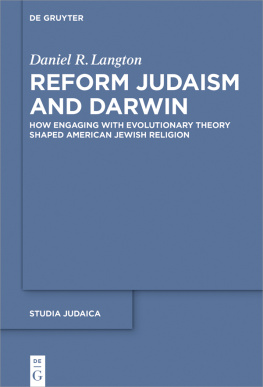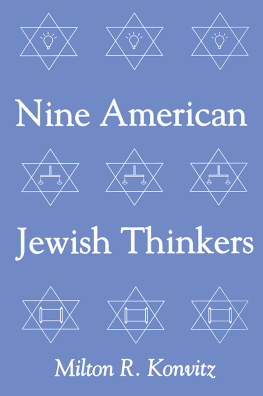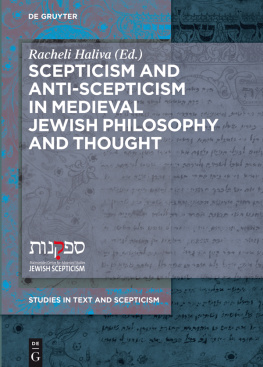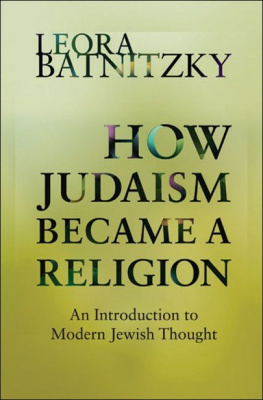Contents
Guide

Daniel R. Langton
Reform Judaism and Darwin
Studia Judaica

Forschungen zur Wissenschaft des Judentums
Begrndet von
Ernst Ludwig Ehrlich
Herausgegeben von
Gnter Stemberger, Charlotte Fonrobert,
Elisabeth Hollender, Alexander Samely
und Irene Zwiep
Band 111
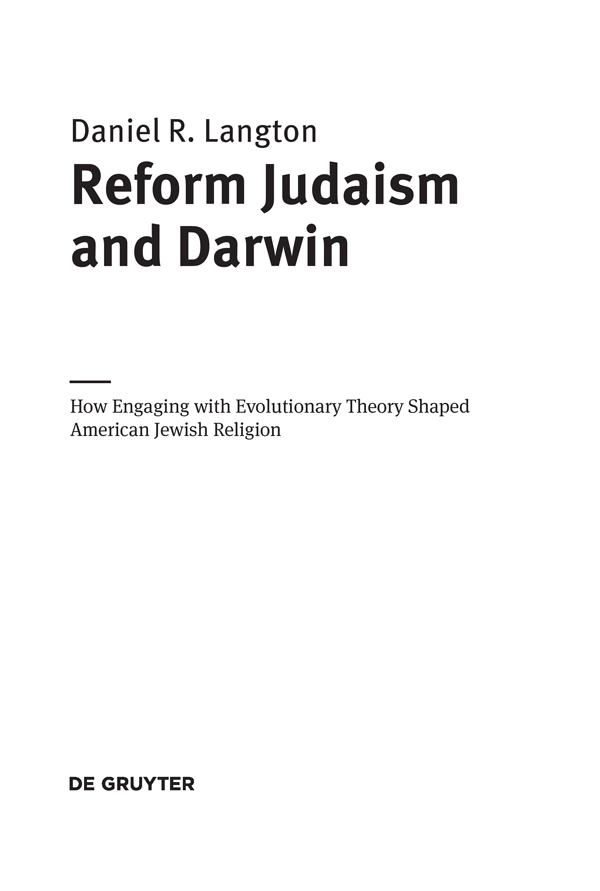
ISBN 978-3-11-065913-9
e-ISBN (PDF) 978-3-11-066411-9
e-ISBN (EPUB) 978-3-11-066122-4
ISSN 0585-5306
Library of Congress Control Number: 2019944065
Bibliographic information published by the Deutsche Nationalbibliothek
The Deutsche Nationalbibliothek lists this publication in the Deutsche Nationalbibliografie;
detailed bibliographic data are available on the Internet at http://dnb.dnb.de.
2019 Walter de Gruyter GmbH, Berlin/Boston
www.degruyter.com
IIntroduction
Among historians of Reform Judaism, which emerged in Germany in the 1810s, which divided British religious Jews from the 1840s, and which came to dominate North American Jewry by the 1880s, there is a general absence of interest in Darwins theory of evolution. The idea of evolution more generally had been used by scholars of religion and by leading Jewish reformers to describe mankinds religious progression from well before Darwins day. The father of German Reform Judaism, Abraham Geiger, presented the emergence of the modern forms of Judaism as an inevitable, evolutionary development from the 1830s; according to his view, history revealed how each generation of Jews had given fresh meaning to the traditional liturgy and practices that had sought to express the core ethical-monotheistic aspects of Judaism, leading to a perpetual state of organic change as the Jewish religion adapted itself to local circumstances and cultures. And similar arguments have been repeated ever since by progressive Jewish thinkers. But whereas Geiger made his argument without reference to biological evolution (in fact, he rejected not only Darwins theory natural selection but even the phenomenon of the transmutation of species itself), From these perspectives, evolutionary theory mainly functioned as an analogy, providing credibility and authority for the radical Reform agenda, but did not in itself contribute significantly to the generation of Reform thought. This study will argue that, contrary to such claims, the passionate engagement with evolutionary theory found in many progressive Jewish writings after the publication of The Origin of Species (1859) is suggestive of a much more important role within North American Reform ideology. At least in the case of the progressives and radicals, it will be argued that evolutionary theory was utilized as the key explanatory framework .
Within the U.S. Reform Jewish movement, the first to respond and stake out their position were the opponents of evolution, writing in the 1860s. way to convince the reader of the central importance of evolutionary theory to them, even if it makes for a somewhat inelegant presentation. It is not a simple argument to make, however, and it is seriously complicated by the challenges of any attempt to untangle the ways in which various scientific, philosophical and Christian ideas and theologies influenced Jewish thought at that particular time and place.
Such an attempt raises some general questions of methodology, since the demonstration of the influence of any idea is often a real challenge for the historian working with ideas. How far can one speak of causality, that is, of an idea having a determinate effect? Does an idea function in a different way, or find its significance altered, having moved from one individuals conceptual world to anothers? Can one say with any degree of certainty who is actually influencing or inspiring whom? Is it a question of plagiarism, adaption, reinterpretation, misinterpretation, or rejection? A related difficulty is the question of origin. Should one view the idea as a logical consequence of previous ideas that make its emergence almost inevitable, or are its origins, in effect, mysterious? What exactly is meant by saying that an idea was already in the air, or that it can take root or transform over time? How does one weigh the importance of different streams or multiple sources of influence? In particular, how does one avoid the sin of parallelomania, that is, the mistake of misconstruing apparent similarities and erroneously constructing parallels and analogies without adequate justification?
Broadly speaking, three areas of historiographical methodology have emerged that, while overlapping, feature distinct emphases in approaching the kinds of questions raised by such a topic of study as this one. The History of Science approach assumes that science is an activity like other human activities and that an idea can be best understood as a product of the surrounding society and culture and of the structural forces at work in those environments; for our purposes, this means understanding the place of evolutionary theory in the wider cultural discourse and in the context of the wider Religion-Science debate in particular, assessing the impact of the emergence and development of Reform Jewish institutions, and identifying the cultural and personal channels of influence between different thinkers, whether Jewish, Christian or scientific. The History of Ideas approach is characterized by an attempt to abstract an idea or doctrine and to trace its morphology through time by such means as reducing the idea into its constituent parts, assessing how it relates to other ideas, and exploring issues such as coherence; for our purposes, this means attempting to relate a cluster of evolutionary-inspired ideas in Reform Jewish theology to each other and tracing the shifting forms of the widespread belief in a law of universal evolution. Intellectual History tends to focus on the interior world of the individuals whose ideas are under examination and on the meanings that they create for themselves; for our purposes, this means taking seriously the ways in which the radical reformers articulated their own and others theologies, attempting to represent accurately how they themselves understood evolutionary theory and its significance, and to give due weight to how their views changed over time. But whichever approach is adopted, the case for the influence of an idea is made by painting an impressionistic picture or presenting a plausible story built up from what is often circumstantial or indirect historical evidence, and by drawing upon contextual knowledge and previous scholarship on the subject. The result rests heavily on the historians own prejudices; it rarely offers a strong degree of certainty and is hardly ever falsifiable. What follows is no different, and must be read with these caveats in mind. Let us consider these three approaches in turn.
In terms of the contemporary social and cultural contexts, a number of important trends or movements are worth highlighting. Interestingly, the familiar cultural and political phenomena of anti-Semitism and Zionism appear irrelevant in the main. Much more significant was the perceived threat from the widespread popularity of materialistic, anti-religious, atheistic philosophies, a malaise which all of the Reform rabbis tended to explain not only in terms of the pernicious influence of prominent sceptics like the Great Agnostic Robert Ingersoll but also in relation to Darwin, or, at least, to a misreading of Darwin. The first wave of appreciative Reform writings on evolution occurred at around the same time that some of the key institutions of Reform Judaism were being established, including the Union of American Hebrew Congregations in 1873 and the Reform rabbinical training college Hebrew Union College (HUC) in 1876. Not long after the 1881 pogroms of Russia initiated a period of mass immigration of Eastern European Jews, the Pittsburgh Platform of 1885 attempted to set out those beliefs that defined Reform Judaism in North America and distinguished it from other Jewish denominations and experiences. Convened at the urging of Krauskopf among others, and proceeding under Wises presidency and Kohlers Chairmanship, the Platform declaration famously declared that

